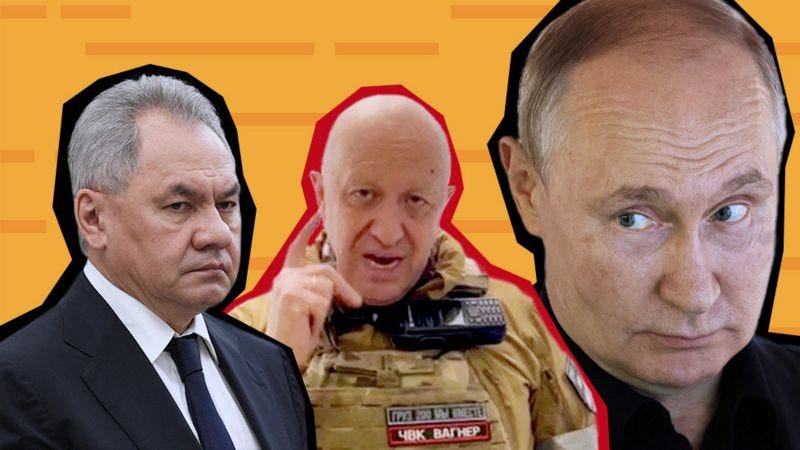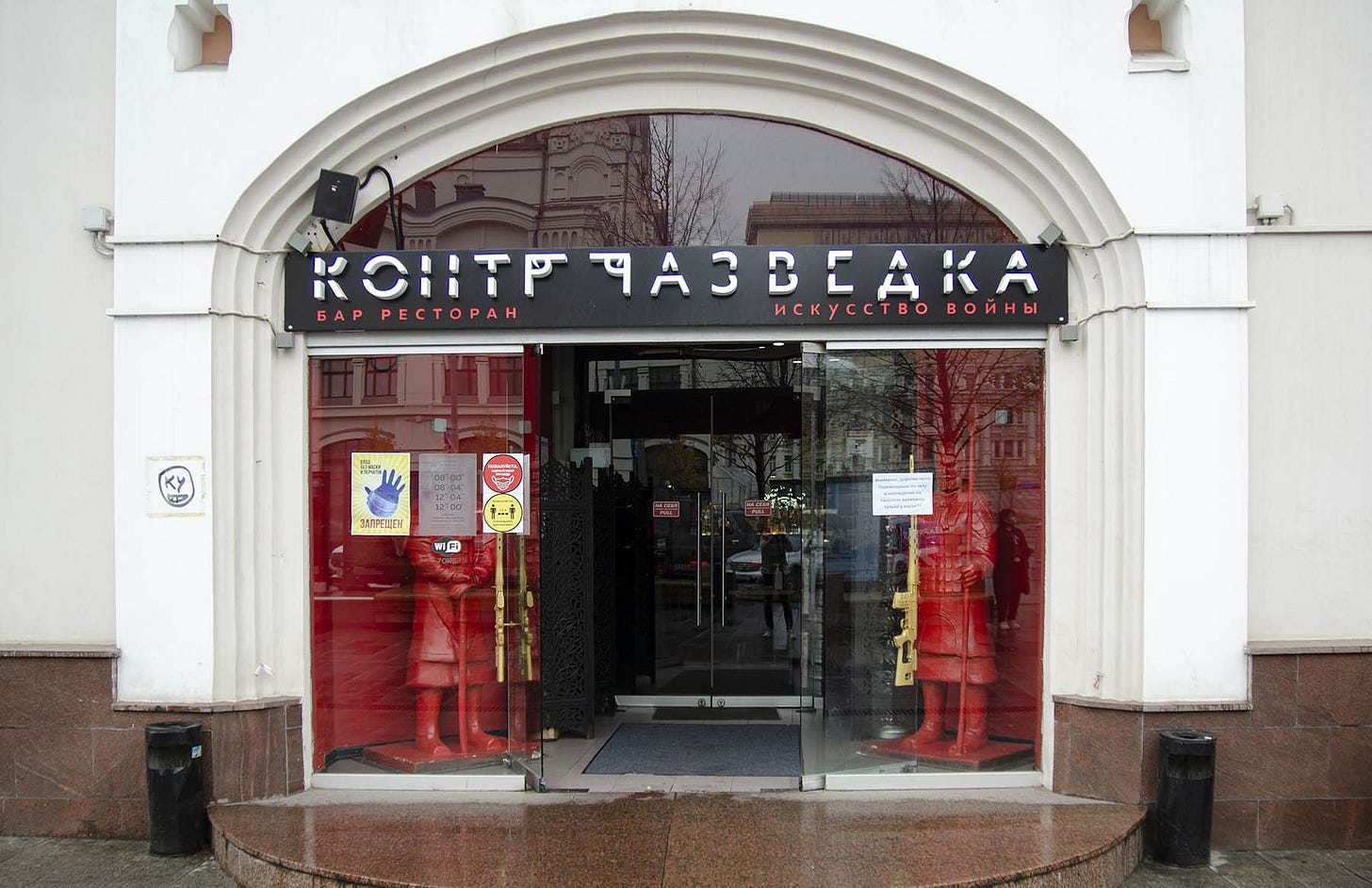WEEKEND READ: 24 hours that shook Russia - a Muscovite's view of the Wagner mutiny
In Moscow, Yevgeny Prigozhin's short-lived stand-off against the Russian state was over as fast as it started. But the silence which greeted it spoke volumes, says our occasional Moscow diarist.
Last Friday night, I asked the cab driver: is your sat nav working all right? Nowadays, when security in Moscow is heightened, authorities scramble GPS signals and drivers get lost. And that night, security measures were at fever pitch.
A thousand kilometres away, Rostov-on-Don, the largest city in the Russian south, was being taken over by a private army. The company called Wagner Group, created 10 years ago to help Vladimir Putin achieve his shadowy military goals, went out of control.
And so astonished Muscovites witnessed a counteraction: a few armoured personnel carriers raced through the centre of the city to be stationed near government buildings.
My taxi made it to the centre with no problems. No soldiers were seen. Downtown was heaving with young drunken crowds, seemingly oblivious to the kind of events which were last seen in Russia at least 30 years ago. I went to Lubyanka square with its massive buildings housing the FSB, the federal security service. If there were soldiers on guard, they must have been hidden out of sight. Opposite the FSB the music from the bar aptly named 'Counterintelligence' was rattling windows all around the block.
Two men stumbled out to the pavement. And then I heard one of them shouting: “He’s gone crazy, who does he think he is, Prigozhin!”. Ah, Evgeny Prigozhin, the head of the Wagner Group. Even the drunken party goers knew.
With the hindsight, everyone can say they saw it coming. Mr. Prigozhin, a bald man with coarse features and the demeanour of an angry truck driver, was getting more and more irritated with each passing week. Since late last year, a conflict was brewing between him and the Russian Ministry of defence: Wagner’s chief accused the generals of starving his troops of ammunition, preventing them from moving ahead on the battlefields in Ukraine, causing heavy losses among his men.
In one of his outspoken videos (they always went viral), Prigozhin was recorded against a background of dead Wagner soldiers. “Where the f*** is the ammo?” Prigozhin shouted, adding expletives not normally attached to the names of Russian defence minister Sergei Shoigu and his chief of Staff Valery Gerasimov.
For years, the Kremlin denied the very fact that Wagner Group existed. Journalists discovered its training grounds close to the border with Eastern Ukraine, invaded by Russia in 2014. When not busy there, its mercenaries fought on the government side in Syria and its military instructors were clinching deals with African governments too unstable to protect their rich mineral resources. Yet Vladimir Putin was pulling a surprised face when asked about Wagner, and Mr. Prigozhin was suing journalists who linked his name to all this.
Everything changed last February when the Kremlin launched a full scale invasion of Ukraine. Wagner went to the forefront of the battles, its men were called heroes. They were given tanks, artillery, and anti-aircraft guns. Billboards all over Russia were plastered the company’s recruitment offers and Prigozhin himself was seen touring Russian prisons offering inmates substantial salary and a ticket to freedom if they manage to stay alive on the front for six months. Those same ex-inmates were dying in their thousands, the first in lines attacking Ukrainian troops.

As I walked in the night through the centre of Moscow, silence set in. All looked normal. A couple was waiting for the traffic light to go green. “He has no chance against the army”, — said the man. “What army are you talking about?” — replied the woman. She had a point. After 17 months of failing invasion, Russian troops are incredibly stretched, their losses – both in manpower and arms – are enormous. Did Putin actually have units capable of stopping Wagner fighters?
In Ukraine, Bakhmut, a city of 70 thousand, took Russians 10 months to conquer. Wagner was leading the attacks. Finally, Bakhmut fell. Prigozhin’s rift with officials deepened after suggestions came to subordinate his army to the Ministry of Defence.
It was then that he started saying things unimaginable for anyone on the government side of the war. He called Ukrainians a brave and noble adversary, he said they had the reason to die fighting – to defend their motherland, but Russia? Russia had no business launching the war in Ukraine, he said. Then he asked for more artillery rounds to go and fight there.
And now he had snapped, driving Wagner troops, rotated out of the battlefield, into Rostov, demanding the resignation of the Defence Minister and his Chief of Staff. And the Russian authorities did not know what to do.
I finished my walk at half past two in the morning right by the Kremlin. Out of nowhere, a cavalcade of minibuses with dark windows appeared. A man with a very long rifle checked some papers and let the vans drive into Kremlin. I could guess what people in those buses came to discuss, but what had they decided?
By Saturday morning, it wasn't any clearer. Vladimir Putin went on TV and called the Wagner group mutineers, and then was heard (or seen) no more. And Prigozhin’s troops continued to roll towards Moscow. Planes and helicopters were sent to try to stop them. They were shot down. The exact count is still not known, but it’s thought that at least a dozen airmen were killed. The Russian authorities started to set roadblocks and checkpoints. Those looked puny compared to the kind of arms the Wagner fighters were bringing.
I went back to downtown. In government quarters people with the same long rifles were moving in and out of gates, a pile of flak jackets was laying on the ground. T the Federal Security Service headquarters it was a busy working day with massive doors opening and closing all the time. Cars with flashing blue lights were driving around. And on Pushkin Square, it seemed the riot police with their white and blue buses had decided to get ready to do what they do best – detain protesters should they come.
But no-one protested in public - although in the relative safety of social networks Russians were livid and scornful. The Russian army – the second best in the world before the war, the second best in Ukraine after the war started and … the second best in Russia after Wagner came back – was one of the most popular memes.
And then, at the speed of a tweet, it was over. Yevgeny Prigozhin said he had decided not to spill Russian blood (presumably that of the government soldiers), and had accepted a deal to move to Belarus He turned the columns of his men back towards their bases somewhere on the border with Ukraine. A huge stash of money was subsequently found at Prigozhin's HQ. He’s unlikely to see it again. Government propaganda lambasted him a traitor and wondered if there was any Western involvement in this. Law enforcement, which launched a criminal case against him, thought for a couple of days and decided it was okay not to prosecute. Never mind a dozen or so articles of the criminal code which were likely to have been violated in the space of those strange 24 hours.
Mr. Putin was back onto the airwaves praising the army and the security services restraint and resolve, saying that those Wagner fighters who want to join the government army are welcome to do so, and the rest can follow Prigozhin into Belarus: no problem and no offence taken. And now the Russian president says with a straight face that the state was financing Wagner all along.
Mr. Prigozhin says he’ll compensate the families of the pilots who died and makes it sound like a trifle. The biggest drama of Putin’s 23-year rule is made to look a mere glitch in the works. But it’s hard to see how the Russian president can look a winner after such a challenge to his authority and how the Russian state – governors, army, police – can be seen as powerful after doing nothing. Few people believe Putin will forgive and forget that.
For now, though, the order is restored. I walked across Moscow again and people with very long rifles are gone. Police patrols are smaller and less tense. One officer I saw on Monday was giggling over something in his smartphone. Perhaps it was a meme.
We are not naming the author of this report, for security reasons.
An abridged version of this piece was broadcast on ‘From Our Own Correspondent’ on BBC radio.
What Putin said about Wagner (with English subtitles)
What Wagner mutiny means for Putin's Russia
By Amalia Zatari & Andrey Goryanov. The Wagner mercenary group's mutiny shows to the world that the key players in Russian President Vladimir Putin's autocratic system are no longer …








